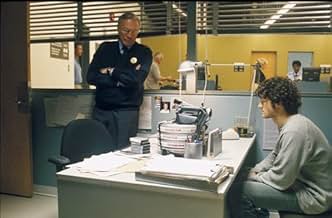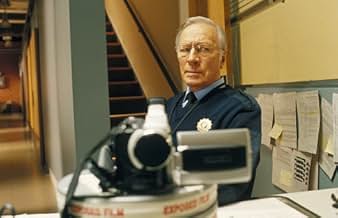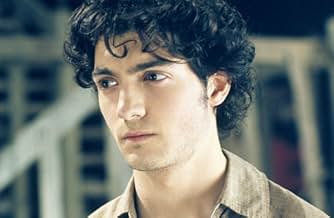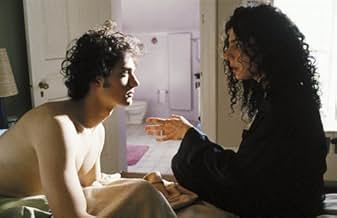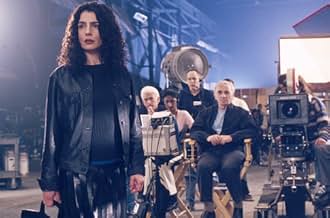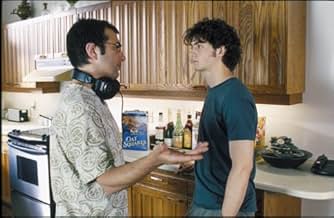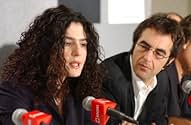Interrogado por um funcionário da alfândega, um jovem conta como sua vida mudou durante a realização de um filme sobre o genocídio armênio.Interrogado por um funcionário da alfândega, um jovem conta como sua vida mudou durante a realização de um filme sobre o genocídio armênio.Interrogado por um funcionário da alfândega, um jovem conta como sua vida mudou durante a realização de um filme sobre o genocídio armênio.
- Prêmios
- 12 vitórias e 13 indicações no total
Avaliações em destaque
Egoyan has managed the trick of avoiding a simple tearjerker black hat white hat polemic like Mel Gibson's The Patriot (or Braveheart or Passion of the Christ or We Were Soldiers or Chicken Run or....) or even 'Schindler's List' by the technique of distancing the audience to one remove, by making his film actually about an Armenian-Canadian filmmaker making a film about the Armenian Holocaust. Obviously, 'Ararat' still manages to stir up powerful emotions, but by also examining the responses of the film cast and crew and their loved ones and others with whom they come into contact the film attains a more mature and introspective value.
Tackling the Armenian Genocide is a tricky matter. Director Atom Egoyan does it by entangling with many issues of art, history and truth. It is a very commendable effort diving deeper than a simple reenactment which the character Saroyan does in the movie. I love every scene where these issues are touched on. I do wish Raffi is played by a more compelling actor. I love Croze but her character adds an unnecessary layer. Her character is struggling with her father's suicide. That emotional conflict is too similar to Raffi's father's death from attempting to assassinate the Turkish ambassador. Raffi and Celia could easily be combined into one character. I would actually keep Croze who is the better actor of the two. With such complex emotions, the cast of characters would be better off with some minor trimming. The same goes for David's family. The movie needs a little bit of emotional trimming.
Rather than simply make a film set at the time of the genocide, Egoyan has chosen to set his film in the present and have his vast assortment of characters reflect on what this almost century-old event means to them in their present lives (most of them are second generation Armenians and Turks living in Canada). One of those characters is an aged film director who, in honor of his mother who endured the atrocities, has come to Canada to make a film about the event. Thus, all the glimpses we get of the actual genocide are film-within-a-film reenactments. In a bit of irony, Egoyan shows just how difficult it is for any work of art to faithfully capture the `truth' of such an event, for falsehoods inevitably creep into the picture the moment the artist alters even minor facts under the guise of `artistic license.' This is particularly ironic given the fact that `truth' and `facts' are such an important part of the case the Armenians have built against the Turks. The film deals head-on with what is `truth' and how much of history comes down to a matter of personal perception.
Egoyan has provided a veritable labyrinth of characters and events, so much so that it becomes almost impossible to provide anything near a comprehensive summary of either the plot or the people who are caught in its entanglements and complexities. Suffice it to say that the film deals with such weighty themes as the intricacies of mother/child relationships, coming to terms with the ghosts from both the private and collective past, and the part denial plays in assuaging our own sense of guilt and responsibility for unspeakable events in history. This denial then allows us to live our lives in unconcerned complacency.
Egoyan views his film almost as a giant canvas and he keeps throwing characters onto it, often without painting the strokes in clear enough detail for us to understand fully what is going on (an apt analogy, given the fact that one of the characters is an actual painter and he deliberately leaves part of his artwork unfinished). Some of the people we meet are fascinating and complex, while others seem underdeveloped and too enigmatic to make much of a contribution to our comprehension of the material. Occasionally, we get the nagging impression that a number of the minor characters and plot strands are left hanging in a state of unresolved limbo. Moreover, the film occasionally lapses into a pedantic tone, as if the writer felt it more important to provide us with a history lesson than involve us in a drama. What promises to be an enlightening character study frequently becomes a polemic.
Structurally, `Ararat' is very complex, with the director cutting back and forth between characters in the present, one character in the past, and the events of the genocide as depicted in the film being made. Egoyan deserves credit for bringing it all together even if the very artifice of the format ends up distancing the audience from the emotional immediacy of this very grim subject matter. `Ararat' is more of an intellectual exercise than an emotionally involving drama, but it does serve a salutary purpose in raising the public's consciousness about a shameful, tragic moment in history that has for too long gone unrecognized by the general public.
Você sabia?
- CuriosidadesArarat (2002) premiered as part of the 'Official Selection' at the 55th Cannes International Film Festival in 2002, but it was not 'In Competition' for any awards. Atom Egoyan's prior feature [O Fio da Inocência (1999)] and his subsequent feature [Verdade Nua (2005)], artistically less ambitious films, were both screened 'In Competition' at Cannes. The reasons for "Ararat" not being part of the 'Official Competition' in 2002 are still ambiguous: Some claim there was political pressure on the festival by Turkey, while Egoyan said he himself decided not to enter Ararat (2002) into the competition: "This film is dealing with a period of history that has never been represented before on film. The idea of subjecting that to the additional pressures of a jury - given all the pressures that are on this film already - seemed to be unnecessary."
- Citações
Raffi: But he thinks Turkey was at war with Armenia. Doesn't it bother you that he doesn't get the history?
Edward Saroyan: No, not really.
Raffi: I mean why didn't you explain to him that we were citizens, we were Turkish citizens. We had a right to be protected.
Edward Saroyan: Are you driving him home?
Raffi: Yeah.
Edward Saroyan: Huh. Take this.
[hands him dollar bills]
Edward Saroyan: Buy him a bottle of champagne. Let him think that he has done something special.
Raffi: Something special? I'm sorry, Mr Saroyan, I don't think I understand.
Edward Saroyan: Young man, do you know what still causes so much pain? It's not the people we lost, or the land. It's to know that we could be so hated. Who are these people, who could hate us so much? How can they still deny their hatred? And so hate us... hate us even more?
- Cenas durante ou pós-créditosClosing disclaimers: 1) The historical events in this film have been substantiated by holocaust scholars, national archives, and eyewitness accounts, including that of Clarence Ussher. 2) To this day, Turkey continues to deny the Armenian Genocide of 1915.
- ConexõesFeatured in The Making of 'Ararat' (2003)
- Trilhas sonorasMystery
Written by Gord Downie (as Gordon Downie) and Atom Egoyan
Performed by Gord Downie (as Gordon Downie)
From the album "Coke Machine Glow"
Courtesy of Wiener Art Records - copyright 2000
Copyright 2000 - Wiener Art (SOCAN)/Egoyan Ego Film Arts (SOCAN)
Principais escolhas
- How long is Ararat?Fornecido pela Alexa
Detalhes
- Data de lançamento
- Países de origem
- Centrais de atendimento oficiais
- Idiomas
- Também conhecido como
- A級控訴
- Locações de filme
- Turquia(Stock Footage, church ruin on the island)
- Empresas de produção
- Consulte mais créditos da empresa na IMDbPro
Bilheteria
- Orçamento
- US$ 15.500.000 (estimativa)
- Faturamento bruto nos EUA e Canadá
- US$ 1.555.959
- Fim de semana de estreia nos EUA e Canadá
- US$ 211.130
- 17 de nov. de 2002
- Faturamento bruto mundial
- US$ 2.743.336
- Tempo de duração1 hora 55 minutos
- Cor
- Mixagem de som
- Proporção
- 1.66 : 1
Contribua para esta página





